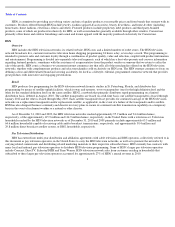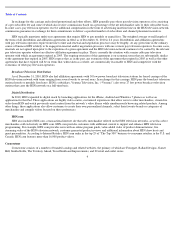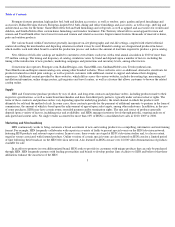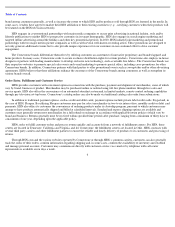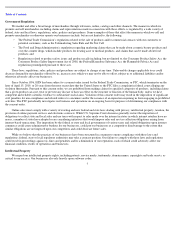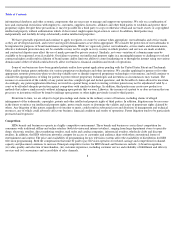Home Shopping Network 2010 Annual Report Download - page 16
Download and view the complete annual report
Please find page 16 of the 2010 Home Shopping Network annual report below. You can navigate through the pages in the report by either clicking on the pages listed below, or by using the keyword search tool below to find specific information within the annual report.
Table of Contents
mix and price points are continuously monitored and adjusted in an attempt to satisfy consumer demand and respond to changing economic and
business conditions, we may not be successful in these efforts, and any sustained failure could result in excess inventory and related markdowns.
In addition, the internet industry is characterized by evolving industry standards, frequent new service and product introductions and
enhancements, as well as changing customer demands. If we are not able to adapt quickly enough and/or in a cost-effective manner to these
changes it could result in lost sales.
We could be subject to additional sales tax liability, including liability for past sales.
U.S. Supreme Court decisions generally restrict the imposition of obligations to collect state and local sales and use taxes with respect to
sales made over the internet. However, a number of states, as well as the U.S. Congress, have adopted or are considering initiatives that would
impose sales and use tax collection obligations arising from internet-based transactions. If these initiatives are successful, we could be required
to collect sales and use taxes in additional states. The imposition by state and local governments of various taxes upon internet commerce could
create administrative burdens for us, put us at a competitive disadvantage if they do not impose similar obligations on all online competitors and
decrease our future sales.
In addition, certain states and local jurisdictions have attempted to collect sales and use tax from businesses without an obvious physical
presence in that state. The successful assertion by one or more states that we should collect sales, use or other taxes on sales in states for which
we do not currently collect taxes could raise substantial tax liabilities, decrease our ability to compete and otherwise harm our business.
Failure to comply with existing laws, rules and regulations, or to obtain and maintain required licenses and rights could subject us to
additional liabilities.
We market and provide a broad range of merchandise through television, online catalogs and other channels. As a result, we are subject to
a wide variety of statutes, rules, regulations, policies and procedures in various jurisdictions which are subject to change at any time, including
laws regarding product safety, consumer protection, privacy, the regulation of retailers generally, the importation, sale and promotion of
merchandise and the operation of retail stores and warehouse facilities, as well as laws and regulations applicable to the internet and businesses
engaged in online commerce, such as those regulating the sending of unsolicited, commercial electronic mail. Our failure to comply with these
laws and regulations could result in fines and/or proceedings against us by governmental agencies and/or consumers, which could adversely
affect our business, financial condition and results of operations. Moreover, unfavorable changes in the laws, rules and regulations applicable to
us could decrease demand for merchandise offered by us, increase costs, subject us to additional liabilities and/or otherwise adversely affect our
businesses. Finally, certain of these regulations impact the marketing efforts of our businesses and brands.
We are currently the subject of a consent order issued by the FTC and violation of this consent order could result in significant civil
penalties and/or an injunction enjoining HSN from engaging in prohibited activities, among other penalties or remedies.
In October 1996, HSN became subject to a consent order issued by the FTC which terminates on the later of April 15, 2019, or 20 years
from the most recent date that the United States or the FTC files a complaint in federal court alleging any violation thereunder. Pursuant to this
consent order, HSNi (including its subsidiaries and affiliates) is prohibited from making claims for specified categories of products, including
claims that a given product can cure, treat or prevent any disease or have an effect on the structure or function of the human body, unless it has
competent and reliable scientific evidence to substantiate such claims. Violation of this consent order may result in the imposition of significant
civil penalties for non-
compliance and related redress to consumers and/or the issuance of an injunction enjoining us from engaging in prohibited
activities. The FTC periodically investigates our business and operations on an ongoing basis for purposes of determining its compliance with
the consent order.
13


